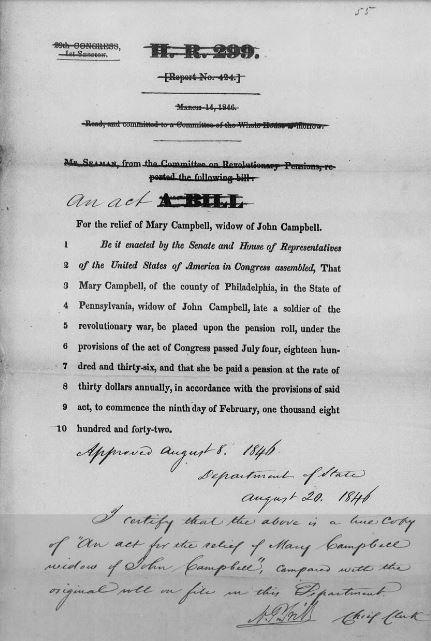Entry #4
If you think that government red tape is something invented in our generation, think again. In fact, it certainly predates the last century. Consider my husband’s fifth great-grandmother, Mary Jackson Campbell. Her husband, John Campbell, fought for with the Colonials in the American Revolution, yet proving his service became an ordeal that lasted for nearly 15 years.
John Campbell was born in Wilmington, Delaware, in 1750 and married Mary Jackson of Baltimore in 1771. We do not know much about Mary Campbell prior to her struggle with the United States government, but she and John appear to have moved between making their home in Baltimore and Philadelphia. John Campbell died in 1803 at the age of 48. He seems not to have been eligible for a pension for his service at the time of his death, but by an Act of Congress in 1832, military pension eligibility was greatly expanded. Further legislation in 1836 extended benefits to certain widows whose husband’s may have been eligible under the 1832 law. Mary Campbell must have been hopeful that she would now be able to receive her husband’s pension, but it was not to be. The problem was that Mary could not prove her claim that her husband had legitimately served. What remains to tell Mary’s story is about 50 pages of declarations, supporting documentation and correspondence generated in her quest to get the pension she believed was due to her.
The first declaration in the file is from January 1837. It states that Mary Campbell first attempted to apply to the Legislature of Pennsylvania for relief in December 1831; she was upwards of seventy-three years of age. At that time she procured an affidavit from Caleb P. Bennett, the former Governor of the State of Delaware, to support her claim. Governor Bennett was the only surviving Revolutionary War soldier of her acquaintance who was also familiar with her husband’s service. Governor Bennett had subsequently died, though.
The first difficulty was that Mary Campbell could not produce a military discharge for John. “She recollects that her said husband had his discharge, but what has become of it, she is now unable to say; she believes it was burnt along with some other papers many years ago, deemed useless.”
Mary is usually described as infirm and feeble. In one declaration Mary refers to herself as poor and infirm with no means of livelihood except by her needle and the assistance of her friends. She had no property, real or personal, except for a few articles of furniture in her room. On March 3, 1837, Mary received a response from the War Department stating that they had no record of the company or regiment of Captain George Latimore under which John Campbell claimed service. Further, the widow was told that her claim before a Justice of the Peace was not valid; she would need to make a new declaration before a Judge of Record and prove in which regiment her husband had served. Several years dragged by…
Mary Campbell seems to have had one ace up her sleeve. She was assisted in her application by her grandson, John Hull Campbell, Philadelphia attorney-at-law. Sometime in 1839, John H. Campbell withdrew his grandmother’s petition, stating that they could offer no additional proof of her husband’s service. In 1842, though, the matter was put before the United States Congress. In what seems like classic bureaucratic bungling, the pension office made a formal recommendation to Congress that the claim of Mary Campbell be rejected “on the ground that there was no evidence that Captain Larmore, under whom she alleges her husband served, was ever in the army.” The petition for a pension was again denied.
Finally, in 1846, Mary made another petition to Congress. The Committee on Revolutionary Pensions corrected that Captain Latimore, not Larmore, was John Campbell’s superior officer. (At no point did the pension declarations say “Larmore.”) Congress accepted that Governor Bennett’s affidavit was credible – he had served with John Campbell at the Battle of Staten Island. Mary Campbell was awarded her pension of $30 per year by Special Act of Congress on August 8, 1846. She was 94 at the time.
Mary Campbell only lived another year and a half. She died on February 17, 1848, in Philadelphia, Pennsylvania. I have not yet located the burial places for either John or Mary.

[…] – “Mary Jackson Campbell – It Took an Act of Congress” by Cheryl Biermann Hartley on My Search for the […]
[…] nearly nine years trying to receive a widow’s pension of an old Revolutionary soldier. (See “Mary Jackson Campbell – It Took an Act of Congress – 52 Ancestors #4.”) Why was it so difficult for her to prove that her husband was a […]